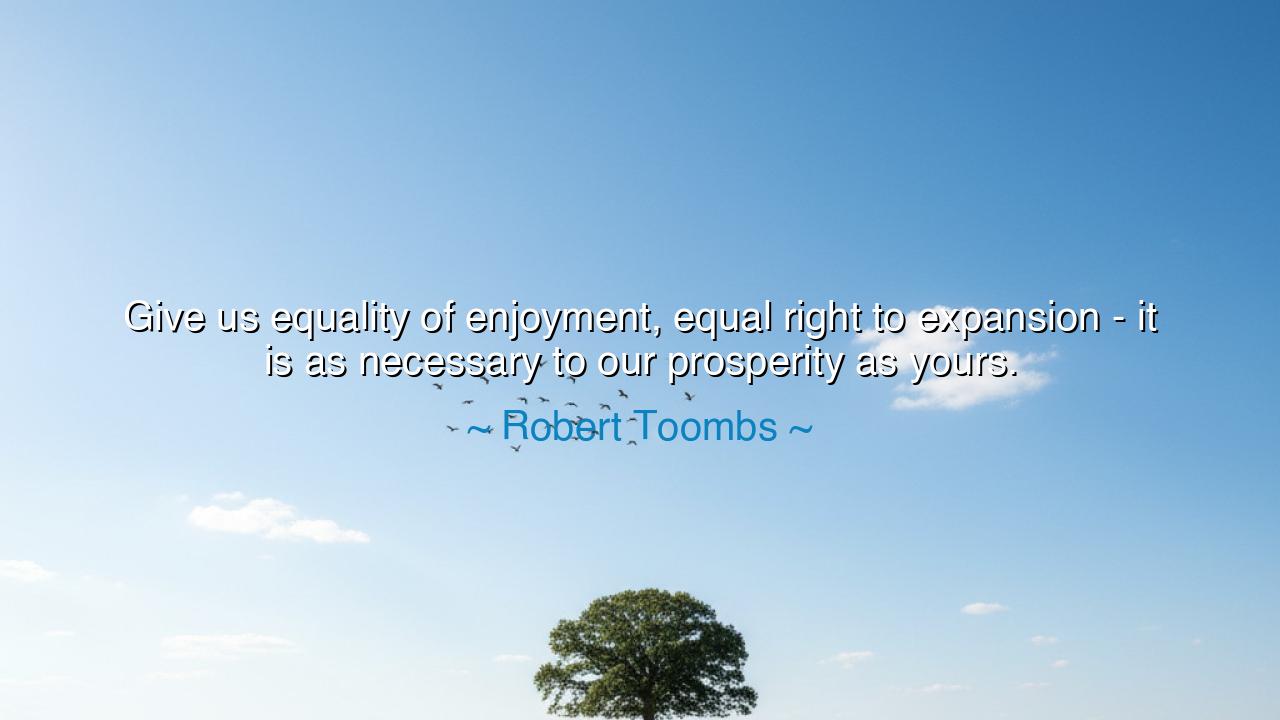
Give us equality of enjoyment, equal right to expansion - it is
Give us equality of enjoyment, equal right to expansion - it is as necessary to our prosperity as yours.






When Robert Toombs declared, “Give us equality of enjoyment, equal right to expansion — it is as necessary to our prosperity as yours,” he spoke with the fervor of a man defending what he believed to be the very essence of liberty and sovereignty. His words, though rooted in the politics of his time, echo a timeless truth about the human spirit: that no nation, no people, and no individual can thrive in the shadow of inequality. Toombs’s plea was not only a political demand, but a reflection of a universal cry — the yearning of the human soul for fairness, opportunity, and recognition. In these words, one hears both the voice of ambition and the shadow of injustice, for Toombs’s era was one in which the meaning of equality itself was deeply contested.
The origin of this quote lies in the turbulent years leading up to the American Civil War, a time when the United States was fractured over the question of slavery and the rights of the states. Toombs, a Georgian senator and later a Confederate leader, spoke these words in defense of the Southern states’ claim to expand their economic and political system — including slavery — into new territories. Though his cause was bound to a flawed and tragic institution, the underlying principle he invoked — the call for equality of opportunity and the right to prosperity — carries a broader philosophical resonance. Stripped of its historical burden, the sentiment reflects a fundamental truth of civilization: that prosperity without equality breeds division, and that the peace of a nation depends upon the fairness with which its opportunities are shared.
Toombs’s words can be read on two levels. In their historical sense, they reveal the deep divisions that tore America apart — the South’s belief that it was being denied economic equality and political respect, and the North’s conviction that true equality could never coexist with slavery. In their universal sense, however, his words transcend the 19th century and speak to the eternal balance between freedom and fairness. When one group prospers while another is bound, resentment becomes inevitable; when the gates of progress open only to the few, the many will one day rise to knock them down. Thus, Toombs’s cry — “Give us equality of enjoyment” — reflects a paradox of human history: that even those who misunderstood equality in their own time still sensed its vital necessity.
Throughout the ages, empires and nations have fallen when equality of enjoyment was denied to their people. In ancient Rome, the republic collapsed when wealth gathered in the hands of the few and the farmer-soldiers — once its backbone — were left impoverished. The Gracchi brothers, who sought to redistribute land to the common people, died for their vision, but their cause echoed through the centuries: that no society endures when opportunity becomes the privilege of a class. So too, in Toombs’s America, the question of who would enjoy the fruits of the nation’s vast lands and labor would determine its fate. It was not simply a political matter, but a moral reckoning — one that would soon be paid in blood.
There is a tragic irony in Toombs’s legacy. He invoked equality to defend inequality, using the language of justice to preserve a system built upon bondage. Yet even within that contradiction lies a lesson for every age: that ideals can be corrupted when they are wielded in the service of fear or self-interest. True equality, as the ancients and the wise have always taught, cannot exist unless it honors the dignity of all. It is not the equality of the strong to dominate, but the equality of all to live, to labor, to prosper, and to hope. To demand equality only for oneself is not justice — it is privilege disguised as principle.
And yet, Toombs’s words remind us of the power of desire for fairness that runs through the heart of humanity. Every worker who demands fair wages, every nation that seeks recognition, every oppressed people who cry for freedom — all echo that ancient call: “Give us equality of enjoyment.” The cry itself is neither Southern nor Northern, neither ancient nor modern; it is the voice of the human condition, forever asking to stand upright and unchained beneath the sun. The error lies not in the yearning, but in the blindness of those who forget that their neighbor hungers for the same light.
Let this, then, be the lesson passed to future generations: equality is not a favor to be granted, but a right to be shared. Prosperity gained at the expense of others is fleeting, but prosperity built upon mutual respect endures. Whether between nations or within hearts, the law of balance is eternal: if one man’s freedom rises while another’s falls, both are diminished. Therefore, let us labor not for the equality of rhetoric, but for the equality of reality — in opportunity, in justice, and in the right to live fully and freely. For as Toombs’s words remind us, whether in his age or ours, the prosperity of one is bound to the prosperity of all, and no civilization can flourish unless it honors that sacred truth.






AAdministratorAdministrator
Welcome, honored guests. Please leave a comment, we will respond soon